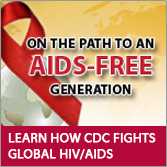Papua New Guinea
HIV/AIDS in Papua New Guinea
- 0.7% Estimated HIV Prevalence
(Age 15–49)(2013) - 1,500 Estimated AIDS Deaths (2013)
- 15,000 Estimated Orphans due to AIDS (2013)
- 11,042 Reported Number of Adults Receiving Antiretroviral Treatment (ART)(2012)
- 84% Estimated ART Coverage per WHO 2010 Guidelines
(2012)SOURCE:
UNAIDS Gap Report, 2014, UNAIDS Global Report, 2013
Strategic Focus
CDC has been providing technical assistance (TA) to Papua New Guinea since 2007 through a cooperative agreement with the World Health Organization (WHO), National Department of Health (NDoH) and other partners. The CDC-Papua New Guinea office was established in 2012, and continues to provide TA and support to strengthen the country’s public health system to reduce HIV transmission and mortality.
CDC provides TA to improve and increase workforce capacity through strengthening HIV strategic information systems, to improve the quality of HIV care and treatment, and to help develop a national laboratory system to ensure quality testing and diagnosis for HIV, TB and other opportunistic infections.
Strengthening Surveillance and Health Information Systems
CDC partners with NDoH and WHO to strengthen laboratory capacity through ISO accreditation, train field epidemiologists to improve HIV surveillance, improve quality of HIV patient care and treatment, and strengthen organizational governance and management systems by building staff capacity.
Strengthening Laboratory Systems
CDC provides TA to the Central Public Health Laboratory (CPHL) of the NDoH to increase capacity and improve quality and timeliness of testing for HIV and other diseases. Lab priorities include quality assurance for rapid HIV testing, ensuring that accurate results are provided to clients, and developing strategies for the scale-up of viral load testing.
Building Sustainable, Country-owned Programs: HIV Care and Treatment Quality Improvement (QI)
CDC uses HIVQUAL to improve the quality of HIV care and treatment through the monitoring of quality indicators and implementing QI projects. In partnership with WHO and the NDoH, HIVQUAL has grown from a four hospital pilot to now including multiple HIV Treatment Centers throughout the country.
Key Activities and Accomplishments
Field Epidemiology Training (FET)
CDC’s four course Field Epidemiology Training includes an intervention project and uses intensive mentoring. Embraced and funded by NDoH, the program has trained field epidemiologists working in the NDOH and at the provincial and district levels in providing leadership in HIV surveillance, HIV program monitoring, evaluation, and reporting as well as disease control activities. About 60% of FET research projects and interventions are associated with HIV, TB and STI disease surveillance and control in various provinces.
HIV Quality Improvement (HIVQUAL)
The HIVQUAL program best fits the needs of resource-limited countries like Papua New Guinea, and has been accepted as the standard for measuring and raising the quality of HIV patient care and treatment. Four regional medical officers have been trained, who have piloted HIVQUAL at their sites and are now the local trainers to roll out HIVQUAL in other centers. The program training is now funded by NDoH.
Contact Us:
- Centers for Disease Control and Prevention
1600 Clifton Rd
Atlanta, GA 30333 - 800-CDC-INFO
(800-232-4636)
TTY: (888) 232-6348
24 Hours/Every Day - cdcinfo@cdc.gov
 ShareCompartir
ShareCompartir



